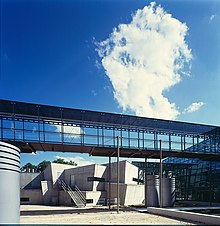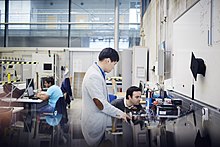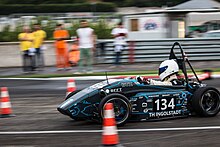Technical University of Ingolstadt
| Technical University of Ingolstadt | |
|---|---|

|
|
| founding | 1994 |
| Sponsorship | state |
| place | Ingolstadt |
| state |
|
| country |
|
| president | Walter Schober |
| Students | approx. 6,000 |
| Employee | approx. 660 |
| including professors | about 150 |
| Website | www.thi.de |
The Technical University of Ingolstadt (short THI ) is a university of applied sciences based in Ingolstadt . It was founded in 1994 and has around 6,000 students in five faculties (since 2019) (electrical engineering and information technology, computer science, mechanical engineering, industrial engineering and THI Business School ). It offers over 60 courses. The core profile of the university includes the focus on technology and business. With around 660 employees in science and administration, it is one of the medium-sized universities in Bavaria . With the scientific lead center for vehicle safety CARISSMA ( Center of Automotive Research on Integrated Safety Systems and Measurement Area ), the THI is the first research building in Germany at a university of applied sciences. In the meantime there is also a branch in Neuburg adDonau .
history
In 1994 the educational institution was founded as a state university of applied sciences at the Hohe Schule site , the building of the historic University of Ingolstadt . Hartmut Sax is the founding president . The range of courses consists of the business administration diploma course . In 1995, the contract to purchase land for the new building between the Free State of Bavaria and the city of Ingolstadt was signed. The planning contract is awarded to the architecture office Keiner, Fürstenfeldbruck . In 1996 the graduate course in industrial engineering was added. The topping-out ceremony on the new campus on the Esplanade takes place in 1997 and the graduate courses in mechanical engineering and combined studies in industrial engineering / automotive mechatronics are introduced. Gunter Schweiger becomes second president in 1998 , the range of courses is expanded to include electrical engineering and information technology, and the first company contact fair, Contact, takes place.
In 1999 the company moved into the new building complex on the Esplanade , which cost around 100 million German marks . A dual course of study has been offered with Siemens since 2000 . The former Lord Mayor of Ingolstadt, Peter Schnell , becomes an honorary senator in the same year. In 2001, the diploma course in computer science is introduced, and business administration is already being studied as a bachelor's degree. In 2002, the engineering department was split up into the mechanical engineering and industrial engineering, electrical engineering and computer science faculties .
In 2004 the didactic center of the Bavarian universities of applied sciences was relocated to Ingolstadt. It uses the historical building of the high school in Ingolstadt. As a result of an amendment to the Bavarian Higher Education Act, research has become a core task of universities of applied sciences in addition to teaching. The Institute for Applied Research (IAF) is founded.
The Institute for Academic Further Education (IAW) was founded in 2008 as Bavaria's first faculty for academic further education. From this point on, the university has three business areas: teaching, research and further education. Due to a change in the Bavarian University Act, the Ingolstadt University of Applied Sciences is renamed "Ingolstadt University of Applied Sciences".
The university's study center in the historic old town of Neuburg adDonau will move into in 2009. In the same year, Ingolstadt University was one of the first universities of applied sciences to become a full member of the European University Association .
In 2012 Walter Schober succeeds Gunter Schweiger in the presidency. As part of a competition among the Bavarian universities of applied sciences, the university was renamed "Technische Hochschule Ingolstadt" in 2013.
In 2015 the campus extensions will be inaugurated. This gives the THI campus an additional 9,200 square meters and has almost doubled. In the following year, the CARISSMA ( Center of Automotive Research on Integrated Safety Systems and Measurement Area ) research and test center is inaugurated. It is designed as a nationwide scientific lead center for vehicle safety and the first pure research building at a university of applied sciences in Germany. A research branch of the Institute for New Energy Systems (InES) and a branch of the Graduate Center are being built in the study center in Neuburg .
In 2017 the university takes over the Villa Heydeck , the former director's villa in the north of the foundry site becomes the official building of the THI. The Audi Confucius Institute Ingolstadt (AKII), a non-profit institution promoting knowledge of the Chinese language and culture, is opened. In addition to strengthening intercultural understanding, the AKII is intended to promote German-Chinese cooperation in the fields of technology, innovation, sustainability and management. As part of the “FH Impuls” initiative of the Federal Ministry of Education and Research, THI will receive almost 6 million euros over a period of four years for the strategic partnership SAFIR ( Safety for all - Innovative Research Partnership on Global Vehicle and Road Safety Systems ).
In 2018, the THI and the Catholic University of Eichstätt-Ingolstadt (KU) start the joint project “People in Motion”, which is intended to strengthen the transfer of technology and knowledge in the region. As part of the federal funding initiative “Innovative University”, the THI and the KU will receive 15 million euros over a period of five years. The Bavarian Council of Ministers also decides to expand the THI by 2,500 students in Ingolstadt and 1,200 students on a new campus in Neuburg adDonau . At the Ingolstadt site, the new field of study health and life sciences is to be opened in the winter semester 2020/21, and a new campus with the field of construction / energy / environment is to be built at the Neuburg adDonau site .
In 2019, the Ingolstadt Research Center for Artificial Intelligence and Machine Learning (AININ - Artificial Intelligence Network Ingolstadt), based at THI, will be founded. The previous three faculties of the THI will be expanded to five faculties from the winter semester 2019/20. In his government statement, Prime Minister Markus Söder announced that the THI will become a mobility hub in the Bavaria-wide AI network as part of the high-tech agenda . The THI is thus the only university of applied sciences at which such a hub will be located.
In January 2020 the Bavarian Center for Applied Research and Technology with Latin America (AWARE) will be founded at THI .
logo
campus
The official groundbreaking for the expansion of the university took place in July 2011. The Ingolstadt campus is directly adjacent to the historic old town of Ingolstadt . The New Palace and Ludwigstrasse, the city's main shopping street, are in the immediate vicinity . The campus on the Esplanade covers an area of 60,000 square meters. Here you will find the publicly accessible library of the THI, 60 lecture halls, project and seminar rooms, 18 large laboratories as well as 80 laboratories, PC pools and workshops. At the Neuburg adDonau site, a new campus is currently being built with the field of construction / energy / environment.
Study and teaching
The THI offers over 60 courses in the five faculties "Electrical and Information Technology", "Computer Science", "Mechanical Engineering", "Industrial Engineering" and the "THI Business School". The establishment of a further “Sustainable Infrastructure” faculty based in Neuburg ad Donau is in preparation.
A dual course of study is possible at THI in the undergraduate bachelor's and master's degree programs . A distinction is made between two study models: Combined study and study with in-depth practice. In the combined course, the course is combined with vocational training (IHK / HWK degree). The course with in-depth practice combines the course at THI with practical phases in a company without completing vocational training.
The THI cooperates internationally with around 150 partner universities (as of 2019) worldwide. The university offers particularly talented and committed students a two-year support program called “THI Talent”. The Center of Entrepreneurship (CoE) at THI coordinates all start-up activities at the university. The main task of the center is to support competitive start-ups at THI and to ensure the transfer of knowledge between research and practice. The aim is to promote a culture for business start-ups both at the university and in the region.
Undergraduate Bachelor courses
The THI offers the following bachelor's degree programs . All courses can also be studied as a dual study.
| Course of study | graduation |
|---|---|
| Autonomous Vehicle Engineering | Bachelor of Engineering |
| Business administration | Bachelor of Arts |
| Bio-Electrical Engineering | Bachelor of Engineering |
| Computational Life Sciences | Bachelor of Science |
| Digital business | Bachelor of Arts |
| Electrical and Computer Engineering | Bachelor of Engineering |
| Electrical engineering and electromobility | Bachelor of Engineering |
| Energy systems and renewable energies | Bachelor of Engineering |
| Engineering and Management | Bachelor of Engineering |
| Vehicle technology | Bachelor of Engineering |
| Flight and vehicle informatics | Bachelor of Science |
| Global Economics and Business Management | Bachelor of Arts |
| Computer science | Bachelor of Science |
| Engineering | Bachelor of Engineering |
| International trade management | Bachelor of Arts |
| International management | Bachelor of Arts |
| Artificial intelligence | Bachelor of Science |
| Aeronautical engineering | Bachelor of Engineering |
| mechanical engineering | Bachelor of Engineering |
| robotics | Bachelor of Engineering |
| Technical design | Bachelor of Science |
| User experience design | Bachelor of Science |
| business Informatics | Bachelor of Science |
| industrial engineering | Bachelor of Engineering |
Undergraduate master’s courses
The THI also offers the following master’s courses . All courses, with the exception of the Master's course "Applied Research in Engineering Sciences", can also be studied as a dual course:
| Course of study | graduation |
|---|---|
| Applied Research in Engineering Sciences | Master of Science |
| Automated driving and vehicle safety | Master of Engineering |
| Automotive & Mobility Management | Master of Arts |
| Automotive Production Engineering | Master of Engineering |
| Electrical engineering of mobile systems | Master of Engineering |
| Vehicle technology | Master of Engineering |
| Financial management and controlling | Master of Arts |
| Computer science | Master of Science |
| International automotive engineering | Master of Engineering |
| Aeronautical engineering | Master of Engineering |
| Marketing / sales / media | Master of Arts |
| Renewable Energy Systems | Master of Engineering |
| Retail and Consumer Management | Master of Arts |
| Taxes and accounting | Master of Arts |
| Technical development in mechanical engineering | Master of Engineering |
| Technical procurement management | Master of Engineering |
| User experience design | Master of Science |
| Materials technology in mechanical engineering | Master of Engineering |
| industrial engineering | Master of Engineering |
Extra-occupational courses
The Institute for Academic Further Education (IAW) bundles all further education activities of the Technical University of Ingolstadt. The IAW has been system-accredited as a sub-unit of the THI since December 2015. In addition to part-time Bachelor, Master and MBA courses, the institute offers university certificates and customized programs for companies. The Integration Campus (INCA) is also located at the IAW. This prepares refugees with a university entrance qualification for university studies and the labor market in Germany.
| Course of study | graduation |
|---|---|
| Business administration | Bachelor of Arts |
| Digital business | Bachelor of Arts |
| Electromobility | Bachelor of Engineering |
| Vehicle technology | Bachelor of Engineering |
| Management in health professions | Bachelor of Arts |
| Management in social professions | Bachelor of Arts |
| Industrial engineering management | Bachelor of Engineering |
| Course of study | graduation |
|---|---|
| Procurement management | Master of Business Administration |
| Compliance and Corporate Governance | Master of Business Administration |
| Digital business management | Master of Business Administration |
| Electromobility and vehicle electrification | Master of Engineering |
| health Management | Master of Business Administration |
| HR Management - Business Partner | Master of Business Administration |
| International business for engineers | Master of Business Administration |
| IT management | Master of Business Administration |
| Mobility and innovation management | Master of Business Administration |
| Security & Safety Management | Master of Business Administration |
| Simulation based engineering | Master of Engineering |
| Industrial engineering digitization | Master of Science |
Research activities and institutes
In addition to training, the Ingolstadt University of Technology is also heavily involved in research. The university implements a research volume of around 20 million euros per year. This volume corresponds to about a third of the university budget and has almost tripled in the past four years (as of 2020). The research of the THI is located in four research institutes (these are shown in the research map of the HRK as outstanding research priorities), three affiliated institutes as well as in various fields of competence.
AI mobility node and Artificial Intelligence Network Ingolstadt (AININ)
In October 2019, the Technical University of Ingolstadt was named the “Mobility hub in the Bavarian network for artificial intelligence” as part of a government declaration by the Bavarian Prime Minister Markus Söder . The other nodes of data science, health and intelligent robotics are located in Munich , Würzburg and Erlangen at the universities there.
As a hub, THI is responsible for coordinating research on AI mobility in Bavaria and receives additional positions and funds for AI mobility research. The THI focuses on the topics of autonomous driving , unmanned flying and automobile production. The activities of the AI mobility node are bundled in the Research Center for Artificial Intelligence and Machine Learning AININ ( Artificial Intelligence Network Ingolstadt ), which was founded at THI in April 2019. In addition to mobility, AININ also researches the use of AI in the areas of trade, health and production.
Seven partners from science, business and society have joined forces in AININ: The Technical University of Ingolstadt, the Catholic University of Eichstätt-Ingolstadt , the Fraunhofer Society , the City of Ingolstadt, the Ingolstadt Clinic , AUDI AG and the MediaMarktSaturn Retail Group . The perspectives from science, business and society should promote interdisciplinary approaches and make AI solutions from one subject area quickly transferable to other areas. The aim is to transfer research results into socially relevant products and production methods as well as into business start-ups.
CARISSMA research and test center
At the THI, the leading scientific center for vehicle safety CARISSMA ( Center of Automotive Research on Integrated Safety Systems and Measurement Area ) is Germany's first research building at a university of applied sciences. The over 120-meter-long structure has been in operation since 2016 and houses a total of ten test facilities, including an indoor test facility for crash tests and driving tests, a drop tower, a laboratory for Car2X communication and a simulation laboratory. There is also a free test area for complete vehicle tests as well as a driving simulator with a hexapod motion platform and a pedestrian protection laboratory. CARISSMA also benefits from the automotive locations in the European Metropolitan Region of Munich (EMM), to which Ingolstadt also belongs. Manufacturers such as Audi , BMW and Continental AG as well as numerous small and medium-sized companies are located here. CARISSMA researches a. a. for Vision Zero , the European Union's vision of zero traffic fatalities, in the technological fields of passive safety, integral safety, test systems and safe electric mobility. A global security system is to be implemented in CARISSMA in the future through the close networking and integration of different technology fields.
Institute for Innovative Mobility
At the Institute for Innovative Mobility (IIMo), drive systems and energy consumers for road vehicles are optimized in terms of energy efficiency and customer benefits. The research areas of the IIMo are electromobility and systems capable of learning, assembly and connection technology, power electronics and engines and drivetrains. In addition to innovative functional developments and operating strategies, the topics of networked mobility, Industry 4.0 and Smart City are increasingly being incorporated into the projects.
Institute for New Energy Systems (InES)
The research activities of the THI on renewable energies have been bundled at the Institute for New Energy Systems (InES) since 2000 . The application-oriented research at InES is mainly carried out in cooperation with medium-sized industrial partners as well as with research institutions and partner universities. InES is also active in several national and international research associations. Scientists at the institute are represented in numerous national and international committees and advisory boards.
Institute for Applied Sustainability (inas)
The Institute for Applied Sustainability (inas) has been an affiliate of THI and the Catholic University of Eichstätt-Ingolstadt since June 2019. The aim of the institute is to promote research and teaching for sustainable development in Region 10 and to inspire people for sustainable models of life. The inas was created in 2017 on the initiative of THI honorary professor Reinhard Büchl .
Further research activities
Further research activities are located in various fields of competence. According to the THI's presentation, the fields of competence are:
- Material and surface technology
- robotics
- Production now
- aviation
- Sustainable logistics and marketing
- Entrepreneurship and business support (business start-ups from science)
Graduate Center
The graduate center has existed as the central institution of the university since 2013. Its aim is to promote and network young scientists and to secure and further develop quality standards for the doctoral process. The graduate center enables a cooperative doctorate at THI with a university in Germany or abroad. The THI is also involved in the Bavarian Science Forum BayWISS, through which joint doctorates with Bavarian universities are possible. In BayWISS, THI is coordinating the “Mobility and Transport” joint college together with the Technical University of Munich .
Student life
There are numerous student associations at THI. These include:
- Schanzer Racing Electric eV , a racing team that builds racing cars with electric drives and drives international races with them
- Students' Life , an association that organizes events for THI students
- Consult.IN eV , a student management consultancy
- Eta-nol eV , an association that develops a hybrid vehicle powered by ethanol and takes part in races with it
- Our Future eV , a non-profit association committed to sustainability
- NEWEXIST , a start-up initiative
- NICE ( Network and International Culture Exchange ), a network that supports foreign students at the university
- Mabuhay Philippines Förderverein eV , an association that initiates donation projects for the needy in the Philippines
- Student Exchange Club Ingolstadt eV
- Think - The student newspaper
- UNICEF University Group
- Catholic university community
There is also a wide range of sporting events for students and employees as part of university sports .
Web links
- Official website of the THI
- CARISSMA research and test center
- AI mobility node and Artificial Intelligence Network Ingolstadt (AININ)
Individual evidence
- ↑ President W. Schober on www.thi.de
- ↑ Homepage of the Technical University of Ingolstadt. In: thi.de. Retrieved August 6, 2014 .
- ↑ CARISSMA. Retrieved June 8, 2018 .
- ↑ Renaming to Technical University of Ingolstadt. Retrieved May 27, 2019 .
- ↑ CARISSMA. Retrieved June 4, 2018 .
- ^ Audi Confucius Institute Ingolstadt. Retrieved June 4, 2018 .
- ↑ HanBan-Confucius Institute. Retrieved May 27, 2019 .
- ↑ AWARE. Retrieved March 11, 2020 .
- ↑ Campus 2014. In: Website Technische Hochschule Ingolstadt. Retrieved August 6, 2014 .
- ↑ 360-degree tour of the campus
- ↑ Site plan THI. Retrieved June 4, 2018 .
- ↑ THI Talent. Retrieved March 11, 2020 .
- ^ Center of Entrepreneurship. Retrieved February 19, 2020 .
- ↑ Master's degree programs. In: Technical University of Ingolstadt. Retrieved June 8, 2018 .
- ^ Institute for Academic Continuing Education. In: Technical University of Ingolstadt. Retrieved June 8, 2018 .
- ↑ press release. Retrieved February 27, 2020 .
- ↑ Research map . Retrieved February 19, 2020 .
- ↑ AININ. Retrieved February 27, 2020 .
- ↑ Hightech Agenda Bavaria. Retrieved February 27, 2020 .
- ↑ CARISSMA image film
- ↑ CARISSMA. In: Technical University of Ingolstadt. Retrieved June 8, 2018 .
- ↑ Institute for Innovative Mobility. In: Technical University of Ingolstadt. Retrieved February 19, 2020 .
- ↑ Institute for New Energy Systems. In: Technical University of Ingolstadt. Retrieved February 19, 2020 .
- ↑ Institute for Applied Sustainability. In: Technical University of Ingolstadt. Retrieved February 19, 2020 .
- ↑ Areas of Competence. In: Technical University of Ingolstadt. Retrieved February 19, 2020 .
- ↑ Graduate Center. In: Technical University of Ingolstadt. Retrieved February 27, 2020 .
- ↑ Student associations. In: Technical University of Ingolstadt. Retrieved September 7, 2018 .
Coordinates: 48 ° 46 ′ 0.3 " N , 11 ° 25 ′ 54.5" E











